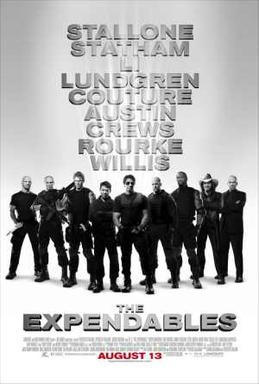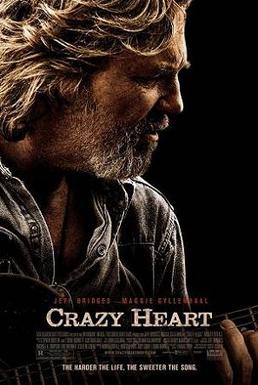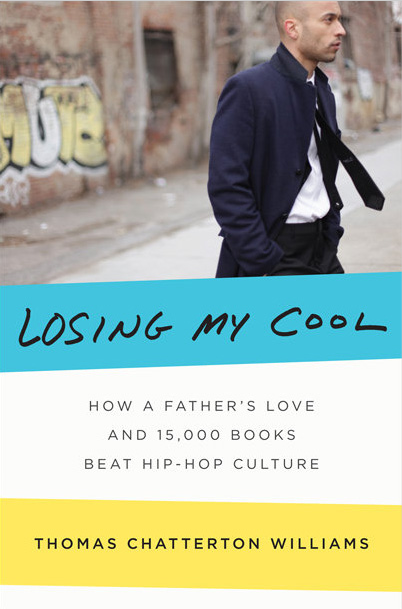A group of elite mercenaries led by Barney Ross (Sylvester Stallone) is contracted by a shady CIA operative (Bruce Willis) to take out the ruling general (David Zayas) of a resource-rich island. Despite his misgivings about the mission, Ross falls for the general’s idealistic daughter (Gisele Itie) and decides to make a difference. But will the general’s backer, a former CIA agent-turned- drug profiteer (Eric Roberts) strike first?
Directed by Stallone and featuring plenty of familiar faces (Mickey Rourke, Dolph Lundgren, Jason Statham, Jet Li, Steve Austin, and, in a cameo, Arnold Schwarzenegger), The Expendables is an homage to the violent action movies of the 1980s. It nails many of the genre’s conventions, but that isn’t necessarily a good thing. Like countless interchangeable explosionfests of yesteryear, The Expendables features paper-thin plotting, flat characterization, substandard acting (Rourke being perhaps the lone exception), and a ridiculously high body count.
What saves The Expendables from being a B-movie with an intriguing cast is its postmodern, tongue-in-cheek sensibility. The script is loaded with in-jokes (Willis’ character shares a name with the Senate committee that depowered the CIA, Ah-nold’s character is mocked for wanting to be president, etc.) and several legitimately funny moments. Lundgren’s character is also a fitting metaphor for the action hero as a whole: drug-addled, unstable, and difficult to work with.
In addition, the action sequences are exciting and credible. Stallone is in great shape for someone on the wrong side of 60, Statham and Li demonstrate their martial arts skills (the former also throws a mean knife), and anyone who wanted to see wrestling legend Austin fight MMA legend Randy Couture will have plenty to cheer about.
The Expendables certainly isn’t breaking any new ground and some will consider it a disappointment in the sense that it remains gleefully shallow despite its self-aware underpinnings. But by the standards of its (admittedly limited) genre, it’s a slam-dunk.
7/10
Sunday, August 22, 2010
Sunday, August 8, 2010
Crazy Heart
Bad Blake (Jeff Bridges) is a washed-up, alcoholic country music star who is reduced to opening and writing songs for his former protégé, Tommy Sweet (Colin Farrell). When journalist Jean Craddock (Maggie Gyllenhaal) approaches him for an interview, they connect and he becomes a father figure to his young son. But will Blake, who is already alienated from his biological son, allow his bad habits to screw up the opportunity?
Crazy Heart is ample evidence that a great performance does not a great movie make. Scott Cooper’s film is slow-paced and conventional to the point of tired. There are numerous similarities to Tender Mercies, right on down to a shared cast member (Robert Duvall). And didn’t Mickey Rourke’s turn in The Wrestler make the “aging screwed-up has-been turns his life around” subgenre obsolete?
Nevertheless, this isn’t worth discarding. Bridges, in an Oscar-winning role, is excellent as the irrepressible Blake, a composite of Kris Kristofferson, Merle Haggard, and several lesser-known musicians. Gyllenhaal and Duvall (as Blake’s sympathetic friend) are rock-solid as voices of reason. Even Farrell is strangely credible as the young upstart Sweet.
Fans of country music will probably be enthralled by the behind-the-scenes talent. In addition to the leads laying down their own vocals, Crazy Heart features contributions from T-Bone Burnett and Ryan Bingham (who won an Oscar for the song “The Weary Kind”). As someone who nearly cringes every time country is played, I can’t say I’m in a position to appreciate any of it.
When all is said and done, Crazy Heart’s tired tale of redemption has just enough juice to win audiences over. You’ll probably like it, but you won’t be able to shake the feeling you’ve seen it all before.
7.25/10
Crazy Heart is ample evidence that a great performance does not a great movie make. Scott Cooper’s film is slow-paced and conventional to the point of tired. There are numerous similarities to Tender Mercies, right on down to a shared cast member (Robert Duvall). And didn’t Mickey Rourke’s turn in The Wrestler make the “aging screwed-up has-been turns his life around” subgenre obsolete?
Nevertheless, this isn’t worth discarding. Bridges, in an Oscar-winning role, is excellent as the irrepressible Blake, a composite of Kris Kristofferson, Merle Haggard, and several lesser-known musicians. Gyllenhaal and Duvall (as Blake’s sympathetic friend) are rock-solid as voices of reason. Even Farrell is strangely credible as the young upstart Sweet.
Fans of country music will probably be enthralled by the behind-the-scenes talent. In addition to the leads laying down their own vocals, Crazy Heart features contributions from T-Bone Burnett and Ryan Bingham (who won an Oscar for the song “The Weary Kind”). As someone who nearly cringes every time country is played, I can’t say I’m in a position to appreciate any of it.
When all is said and done, Crazy Heart’s tired tale of redemption has just enough juice to win audiences over. You’ll probably like it, but you won’t be able to shake the feeling you’ve seen it all before.
7.25/10
Thursday, August 5, 2010
The Blue Star
In this sequel to Jim the Boy, a now-teenaged Jim Glass falls hard for Chrissie Steppe, the mysterious, reluctant girlfriend of local bigshot Bucky Bucklaw, who has left Aliceville to fight in World War II. With war tensions mounting and gossip spreading, Jim tries to figure out a way to win Chrissie over. Meanwhile, a long-ago romance between her mother and Jim’s protective Uncle Zeno threatens to complicate the situation even further.
The Blue Star marks the maturation of not only a character, but an author as well. While Jim the Boy gave Tony Earley a chance to introduce compelling characters and show off his North Carolina roots, there was something cloyingly winsome and provincial about that text. Thankfully, both The Blue Star and its protagonist have developed a bit of an edge. War, love triangles, teen pregnancy, and discrimination permeate this follow-up. Aliceville is still Aliceville, but Earley wisely decided to let more of the outside world in.
This isn’t to say that anyone will be confusing Earley with Palahniuk any time soon. The Blue Star’s plot and conflict are both conventional and familiar, as if ripped from some black-and-white melodrama. However, an infusion of colorful characters keeps it from being too mundane. Jim’s three bickering uncles are back, joined for this go-around by his juvenile friend Dennis Deane and his former flame Norma Harris (who, truth be told, seems a little too nice). Though absent from the actual narrative, Chrissie’s outlaw Cherokee father casts a dark shadow over the book, much the same way Jim’s bootlegger grandfather did the last go-around.
Earley carries over the practice of revealing out-of-narrative information through letters between the adults. It provides an interesting point of contrast for the story that’s being told through Jim’s eyes, but the effect it produces is akin to watching a movie where a lot of the big moments happen off-screen. Similarly, the book’s time structure is incredibly uneven. One day might span two chapters, while the next chapter might take place a month in the future.
The Blue Star’s title refers to a symbol hung in a window to indicate a member of a family is serving during wartime. The set-up for a continuation of Jim's adventures in a future book is insultingly obvious, but like everything else that’s wrong here (the simplicity, the familiarity, the cheese sentimentality), it works anyway. Above all else, Earley has created a character whose life you want to read about, and that is no small feat.
7.25/10
The Blue Star marks the maturation of not only a character, but an author as well. While Jim the Boy gave Tony Earley a chance to introduce compelling characters and show off his North Carolina roots, there was something cloyingly winsome and provincial about that text. Thankfully, both The Blue Star and its protagonist have developed a bit of an edge. War, love triangles, teen pregnancy, and discrimination permeate this follow-up. Aliceville is still Aliceville, but Earley wisely decided to let more of the outside world in.
This isn’t to say that anyone will be confusing Earley with Palahniuk any time soon. The Blue Star’s plot and conflict are both conventional and familiar, as if ripped from some black-and-white melodrama. However, an infusion of colorful characters keeps it from being too mundane. Jim’s three bickering uncles are back, joined for this go-around by his juvenile friend Dennis Deane and his former flame Norma Harris (who, truth be told, seems a little too nice). Though absent from the actual narrative, Chrissie’s outlaw Cherokee father casts a dark shadow over the book, much the same way Jim’s bootlegger grandfather did the last go-around.
Earley carries over the practice of revealing out-of-narrative information through letters between the adults. It provides an interesting point of contrast for the story that’s being told through Jim’s eyes, but the effect it produces is akin to watching a movie where a lot of the big moments happen off-screen. Similarly, the book’s time structure is incredibly uneven. One day might span two chapters, while the next chapter might take place a month in the future.
The Blue Star’s title refers to a symbol hung in a window to indicate a member of a family is serving during wartime. The set-up for a continuation of Jim's adventures in a future book is insultingly obvious, but like everything else that’s wrong here (the simplicity, the familiarity, the cheese sentimentality), it works anyway. Above all else, Earley has created a character whose life you want to read about, and that is no small feat.
7.25/10
Tuesday, August 3, 2010
Losing My Cool: How a Father's Love and 15,000 Books Beat Hip-hop Culture
Growing up in the 1980s and 1990s in suburban New Jersey, biracial Thomas Chatteron Williams fortifies his blackness by investing himself in hip-hop culture. This puts him at odds with his father, a proud black intellectual who had to fight for knowledge and respect. As Williams moves from New Jersey to Georgetown and swaps one set of friends for another, his notions about race and self take a series of dramatic turns.
Social critics are notorious blowhards and memoirists are notoriously self-indulgent, so a memoir by a social critic automatically has two strikes against it. Fortunately, Williams avoids the pitfalls of ponderous polemics and delivers an engaging tale of what it means to be black in the post-Civil Rights Era.
A Union County native (as am I), Williams captures the social geography of the Garden State to a T. Those who grew up in crime-ridden Newark and Irvington welcomed any opportunity to escape, while those who grew up in the suburbs wished they had the inner-city street cred. This moronic paradox underscores the necessity of Williams’ eventual flight to Georgetown and foreshadows his transformation from wannabe thug to perceptive young thinker.
Though an apostate of hip-hop culture, Williams eschews finger-pointing. His message is deeper and more complex than “bling bad, books good.” Instead, he convincingly makes the case that neither rappers nor their admirers (among whom he counts several friends) are inherently negative, but rather that young black men and women should not allow the shoes they wear and the music they listen to define them. It’s an important insight and it’s delivered by someone who’s been through it all.
8.25/10
Social critics are notorious blowhards and memoirists are notoriously self-indulgent, so a memoir by a social critic automatically has two strikes against it. Fortunately, Williams avoids the pitfalls of ponderous polemics and delivers an engaging tale of what it means to be black in the post-Civil Rights Era.
A Union County native (as am I), Williams captures the social geography of the Garden State to a T. Those who grew up in crime-ridden Newark and Irvington welcomed any opportunity to escape, while those who grew up in the suburbs wished they had the inner-city street cred. This moronic paradox underscores the necessity of Williams’ eventual flight to Georgetown and foreshadows his transformation from wannabe thug to perceptive young thinker.
Though an apostate of hip-hop culture, Williams eschews finger-pointing. His message is deeper and more complex than “bling bad, books good.” Instead, he convincingly makes the case that neither rappers nor their admirers (among whom he counts several friends) are inherently negative, but rather that young black men and women should not allow the shoes they wear and the music they listen to define them. It’s an important insight and it’s delivered by someone who’s been through it all.
8.25/10
Subscribe to:
Comments (Atom)



